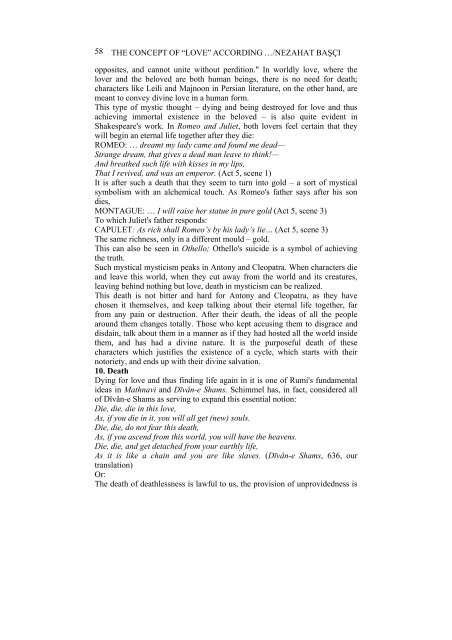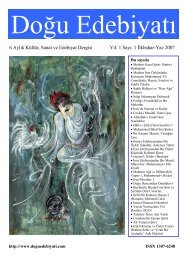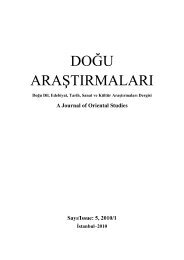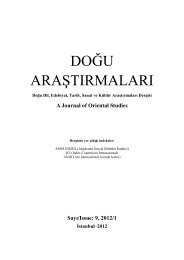A Journal of Oriental Studies Sayı/Issue - Doğu Edebiyatı
A Journal of Oriental Studies Sayı/Issue - Doğu Edebiyatı
A Journal of Oriental Studies Sayı/Issue - Doğu Edebiyatı
Create successful ePaper yourself
Turn your PDF publications into a flip-book with our unique Google optimized e-Paper software.
58<br />
THE CONCEPT OF “LOVE” ACCORDING …/NEZAHAT BAŞÇI<br />
opposites, and cannot unite without perdition." In worldly love, where the<br />
lover and the beloved are both human beings, there is no need for death;<br />
characters like Leili and Majnoon in Persian literature, on the other hand, are<br />
meant to convey divine love in a human form.<br />
This type <strong>of</strong> mystic thought – dying and being destroyed for love and thus<br />
achieving immortal existence in the beloved – is also quite evident in<br />
Shakespeare's work. In Romeo and Juliet, both lovers feel certain that they<br />
will begin an eternal life together after they die:<br />
ROMEO: … dreamt my lady came and found me dead—<br />
Strange dream, that gives a dead man leave to think!—<br />
And breathed such life with kisses in my lips,<br />
That I revived, and was an emperor. (Act 5, scene 1)<br />
It is after such a death that they seem to turn into gold – a sort <strong>of</strong> mystical<br />
symbolism with an alchemical touch. As Romeo's father says after his son<br />
dies,<br />
MONTAGUE: … I will raise her statue in pure gold (Act 5, scene 3)<br />
To which Juliet's father responds:<br />
CAPULET: As rich shall Romeo’s by his lady’s lie… (Act 5, scene 3)<br />
The same richness, only in a different mould – gold.<br />
This can also be seen in Othello; Othello's suicide is a symbol <strong>of</strong> achieving<br />
the truth.<br />
Such mystical mysticism peaks in Antony and Cleopatra. When characters die<br />
and leave this world, when they cut away from the world and its creatures,<br />
leaving behind nothing but love, death in mysticism can be realized.<br />
This death is not bitter and hard for Antony and Cleopatra, as they have<br />
chosen it themselves, and keep talking about their eternal life together, far<br />
from any pain or destruction. After their death, the ideas <strong>of</strong> all the people<br />
around them changes totally. Those who kept accusing them to disgrace and<br />
disdain, talk about them in a manner as if they had hosted all the world inside<br />
them, and has had a divine nature. It is the purposeful death <strong>of</strong> these<br />
characters which justifies the existence <strong>of</strong> a cycle, which starts with their<br />
notoriety, and ends up with their divine salvation.<br />
10. Death<br />
Dying for love and thus finding life again in it is one <strong>of</strong> Rumi's fundamental<br />
ideas in Mathnavi and Dīvân-e Shams. Schimmel has, in fact, considered all<br />
<strong>of</strong> Dīvân-e Shams as serving to expand this essential notion:<br />
Die, die, die in this love,<br />
As, if you die in it, you will all get (new) souls.<br />
Die, die, do not fear this death,<br />
As, if you ascend from this world, you will have the heavens.<br />
Die, die, and get detached from your earthly life,<br />
As it is like a chain and you are like slaves. (Dīvân-e Shams, 636, our<br />
translation)<br />
Or:<br />
The death <strong>of</strong> deathlessness is lawful to us, the provision <strong>of</strong> unprovidedness is





